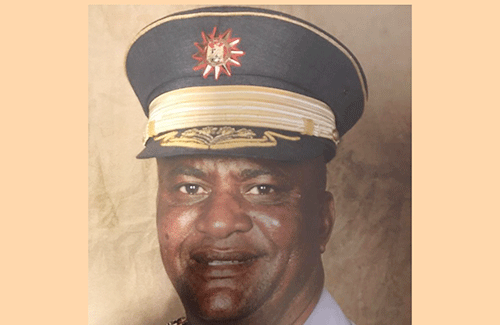At the start of the 20th century, the international community paid little attention to State-sponsored mass atrocities and genocide across the globe.
The international system was predicated on deference to State sovereignty, including in those colonial territories administered by an imperial power. Governments had the first and final responsibility for their people, even if those governments massacred tens of thousands of civilians.
The slaughter of Ovaherero and Nama people in the then-German colonial South West Africa (now Namibia), from 1904 to 1908, earned limited international opprobrium, as did the Ottoman state’s systematic massacres of Armenians in Anatolia during World War 1, which received more attention.
But the 20th century’s first genocide of the Ovaherero and Nama people did not galvanise either a global social movement or a major diplomatic effort to interrupt, stop or punish the perpetrators of the atrocities. That smacked of racism. Apparently, the international norms, policies and mechanisms to prevent and respond to atrocity were “virtually” non-existent.
Fortunately, World War II somewhat changed the situation to a degree. The Holocaust, particularly the systematic annihilation of Jews, demonstrated the devastating potential consequence of the carte blanche national sovereignty. Taken to the extreme that the Nazis did, State sovereignty meant governments had the authority to annihilate whole categories of people from the territories they controlled.
Combined with promises about freedom that Allied powers made during World War II, the lessons of the Holocaust catalysed the victorious States to make human rights a pillar of the new world order. The 1945 United Nations (UN) Charter, the writ that laid the foundation of post-war international peace and security, included pledges to promote human rights. Those international commitments were weak, but they were important nonetheless, and held States to account.
Joint Declaration
Direct participation in the 1904-1908 genocide dialogues involving survivors or descendants of victims of atrocities and genocide and the perpetrators of heinous crimes is a powerful tool for healing and reconciliation in the aftermath of the genocide.
These dialogues can facilitate truth-telling, repentance and forgiveness, fostering a sense of reconciliation and trust within the affected communities.
Unfortunately, a bitter dissension was created when the main agencies of the descendants of the Ovaherero and Nama communities, affected by the genocide and atrocities, the rightful representatives of the descendants’ voices in the negotiations with the German government, and who are historically entitled to such reparations, were not directly represented at the negotiation table, as per the 2006 National Assembly motion.
Admittedly, such a process can be traumatic, as the effectiveness of the dialogue depends on parties’ willingness and the presence of supportive structures.
By bringing the descendants of victims of genocide and/or representatives of the affected communities together with perpetrators of the crimes, these dialogues will create spaces for empathy and shared experiences, fostering a sense of collective healing and reconciliation.
Essentially, dialogue provides a platform for individuals to share their experiences, including trauma of genocide, and to understand the different perspectives involved. By listening to each other’s tragic stories and acknowledging the pain and suffering, participants can develop empathy and understanding for the other side, breaking down barriers and fostering a sense of shared humanity.
Dialogue can facilitate forgiveness, both between individuals and within communities, as it also provides a space for perpetrators to seek forgiveness, and survivors or descendants of victims of genocide to consider the possibility of moving forward.
By engaging in meaningful dialogue, participants can build trust and strengthen social cohesion, creating a more united and resilient community. In addition, participating in dialogue can empower individuals to take control of their tragic stories and shape their future, fostering a sense of hope and agency. And by providing a safe space to process trauma and engage in healing processes, dialogue may succeed and can contribute to the mental and emotional well-being of participants, both individually and collaboratively.
In summary, avoiding conflict dialogues can lead to unresolved issues and increase stress in society and underdevelopment. This avoidance can manifest in various ways, such as changing the subject, deflecting issues to avoid taking responsibility, avoiding face-to-face negotiations, withdrawing from discussions, and/or disagreeing with things to keep the peace.
While these may seem somewhat a harmless way to maintain harmony, avoiding dialogue often means the underlying factors remain unresolved, and that means “sitting on a powder keg”. Advisably, the Namibian and German governments must engage in genuine negotiations face-to-face with the affected communities, or else . . .
This will become a confusing merry-go-round of activities. More importantly, from around the year 1 500, between 25 and 30 million Africans were uprooted for the purpose of slavery, and were sent to work mainly on plantations in the Caribbean and Americas, including the southern United States. But recently, and for the first time in history, at the UN headquarters in New York, descendants of slave owners and enslaved people in former British colonies in the Caribbean sat at the same table to discuss the contentious issue of reparations.
In the case of Namibia-Germany negotiations, can this example be a vivid litmus test for the dialogue?
The descendants of the German conqueror still reap the rewards of a world in which the descendants of colonial settlers remain disproportionately privileged in comparison to the people they once conquered in South West Africa. Germany is a representative of a culpable entity, and must therefore advocate forgiveness, but not the other way around.
*Maj. Gen. (Rtd) J. B. Tjivikua is a descendant of victims of the 1904-1908 genocide.



